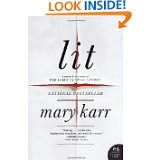Mary Karr’s three memoirs all made the bestseller lists,
beginning with The Liar’s Club back in 1995, and then Cherry in 2000, and finally, in
2009, with Lit. I started with the Liar’s Club last month, and I didn’t let
much else interrupt as I followed Karr’s life story from her childhood in East
Texas to her current post as a professor of poetry and creative writing in New
York State.
These books are worth reading for the writing alone. Karr
brings a poet’s sensibilities to every sentence:
“As a new mother, I used to cup my son’s downy head with
wild tenderness and marvel at his heavy slump in my arms, and for the few
moments his china-blue eyes fixed on mine before they closed, it was as if the
sky had been boiled down and rendered into that small gaze.”
But her poetry, her writing, comes out of the context of a
working class, dysfunctional family in a town where few people read literature
or pursue higher education. Her writing is beautiful because it is gritty and
real and honest.
Beyond the writing, however, is the story. It’s the story of a little girl who had to fend for herself. She was raped at age seven. Her mother entered a mental institution shortly thereafter. And despite her ferocious love for both parents, neither of them offered even the basics of advice or discipline or affection or attention that children need. Karr grew up largely on her own, and she grew up with no use for God.
But her past haunted her. Just as her mother was getting sober, Karr finds herself repeating the patterns of her parents–drinking heavily all the time. When she finally begins attending meetings for fellow alcoholics, she balks at the talk of a higher power: “Higher power, my rosy red ass, I can hear my daddy saying, and Church is a trick on poor people.” And yet this is a story of Karr’s turn towards faith, and not just faith in a higher power, but faith in Jesus as the Lord of life.
I recommend all three of Karr’s memoirs, but if you only want to read one, start with Lit. It’s a story of pain and promise, hurt and hope, seeking and being found.


